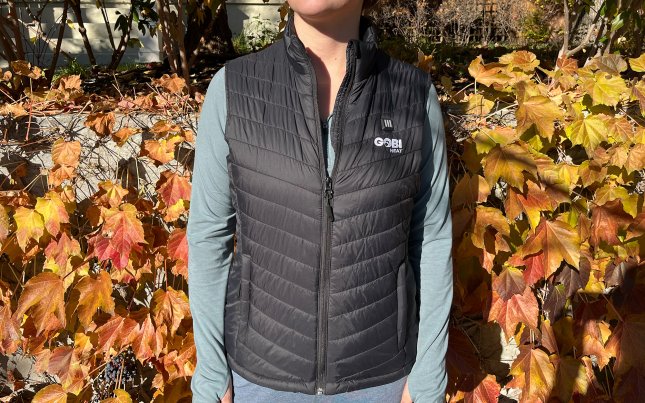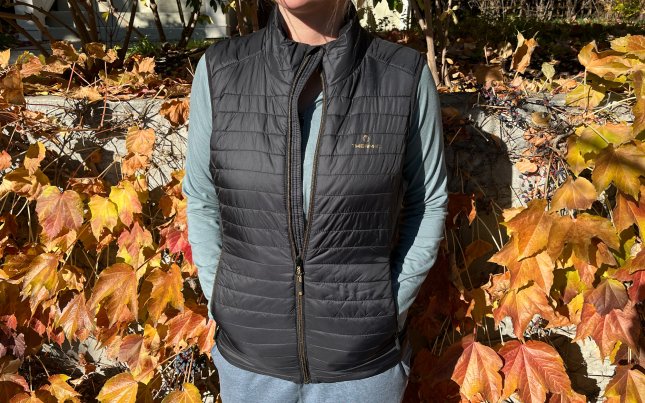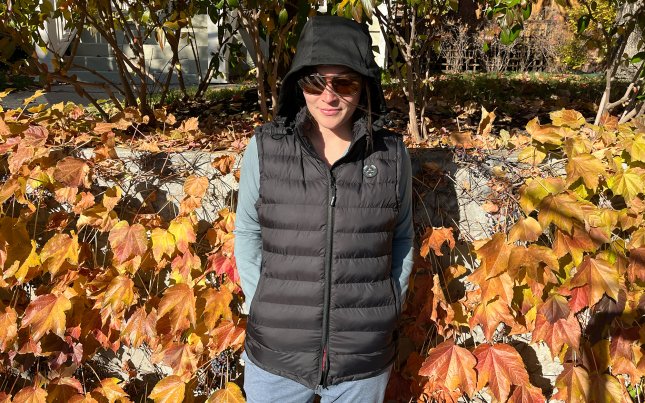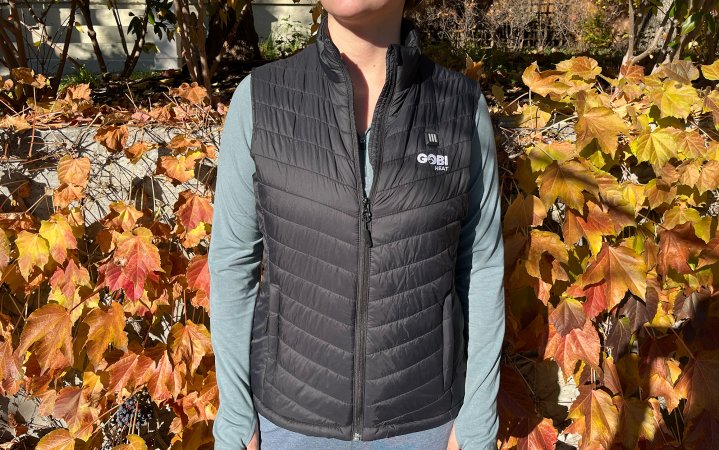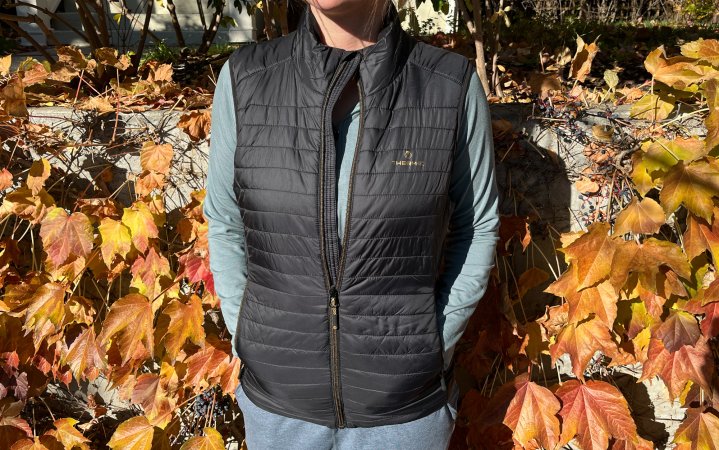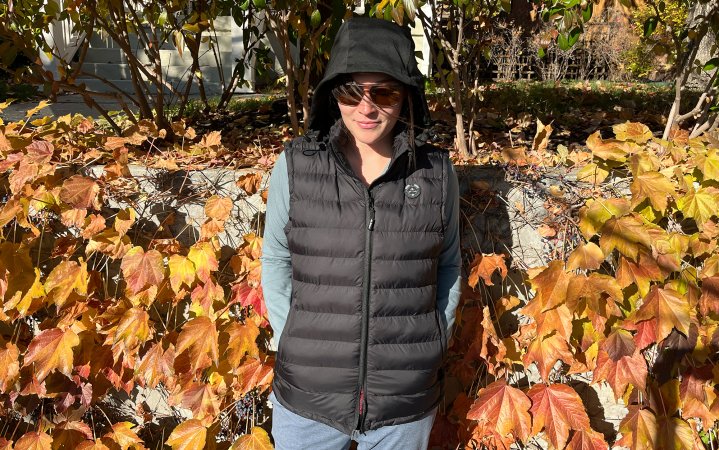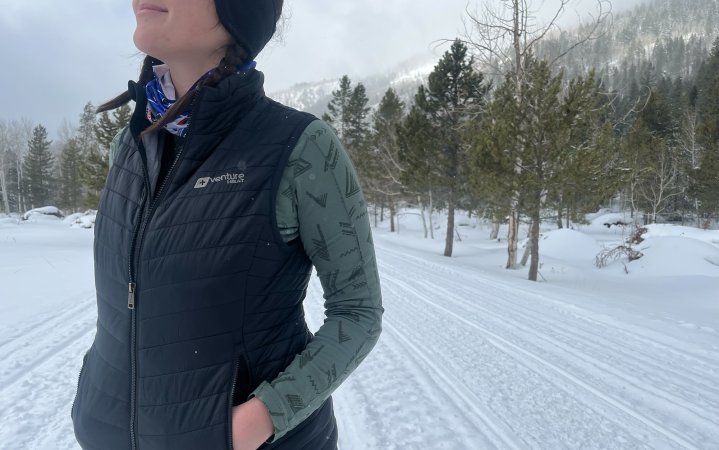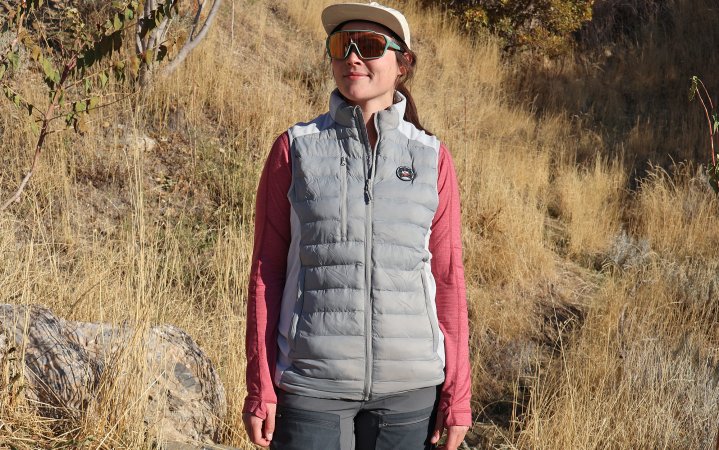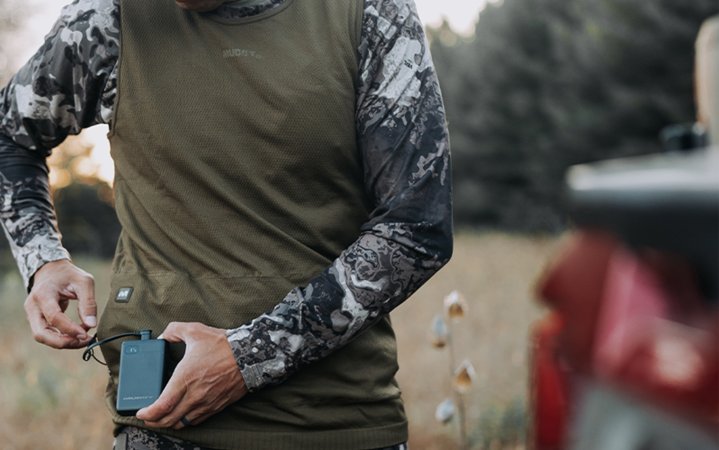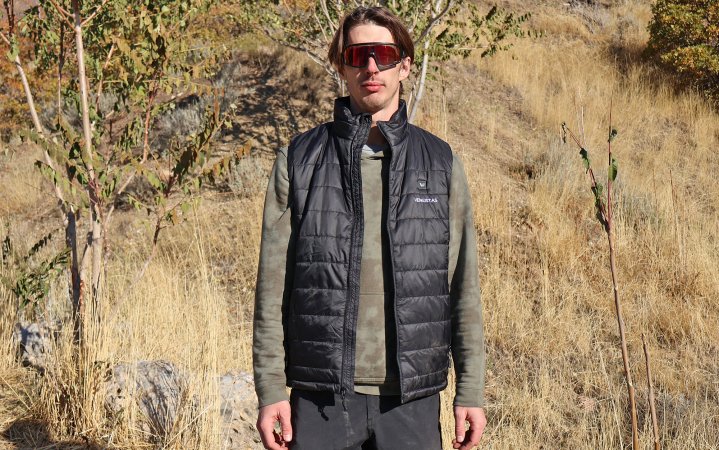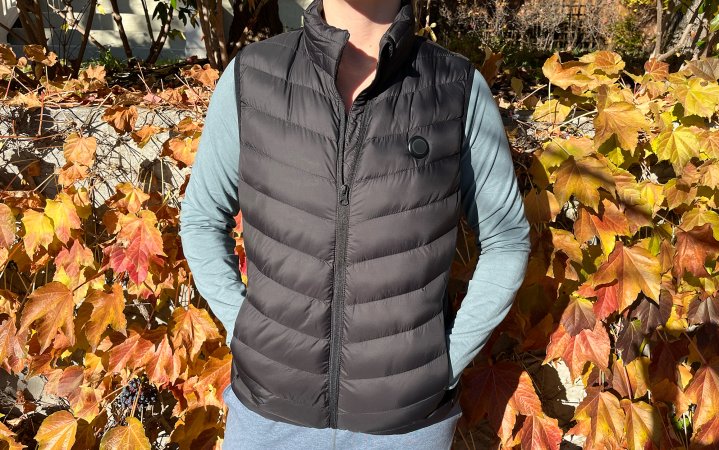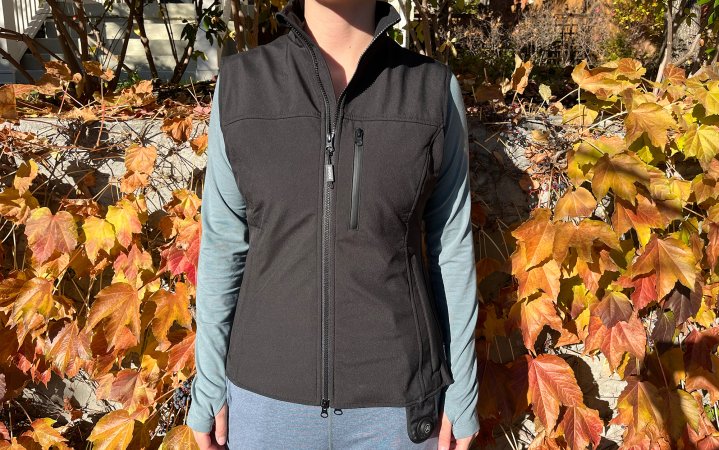We may earn revenue from the products available on this page and participate in affiliate programs. Learn More ›
Sitting still in a frigid blind for hours, shivering on a windy ski lift, or just walking the dog in December, a heated vest might be the answer to your winter blues. But with so many brands out there, all mostly unfamiliar, it’s hard to tell which is an expensive hunk of junk and which will perform as advertised. That’s why I put popular models to the test while camping and skiing to find the best heated vests.
- Best Overall: Gobi Dune Heated Vest
- Best Bluetooth: Therm-ic Heated Vest
- Best with Hood: iHood Heated Vest
- Best with Bluetooth and Collar Heating: Venture Heated Puffer Vest with HeatSync
- Best Budget: Kemi Moto Thermal-Reflective Heated Vest for Men and Women
- Best Base Layer: Muddy Nucleus Heated Vest
- Venustas Upgraded Quilted Vest
- Weston Heated Vest (Upgraded)
- eWool Pro+ Heated Vest
How I Tested the Best Heated Vests
First, I field tested the best heated vests during various activities. I used them while skiing, camping, and walking around my neighborhood. I lent them to friends so we could all compare the vests’ heating zones and battery life. Then I performed some control tests on battery power, heat levels, and features. I also made note of each vest’s comfort, features, and ease of use, especially for those equipped with Bluetooth. I powered on all of the vests while fully charged and checked on them hourly to verify their battery life.
After they were all on and warmed up, I placed a digital probe thermometer inside the sleeve hole and rested the tip on the nearest heating panel to measure the temperature. This is to give an idea at how warm the vests are getting, but it isn’t exact by any means. Most of the manufacturers list much higher temperatures. In truth, I think all of the best heated vests on this list will keep you warm, especially when layered. Continue reading my Things to Consider section for more information on warmth.
Best Heated Vests: Reviews & Recommendations
Best Overall: Gobi Dune Heated Vest
Pros
- Warmest
- Lasts a long time (but not as long as advertised)
- Five color options
- Machine washable
Cons
- No collar heating
- No Bluetooth
Key Features
- Heat Settings: Three
- Battery Life: Up to 5 hours on high
- Heat Zones: Chest and back
- Price: $190
While the vest didn’t achieve the claim of six hours on the highest setting, it was the last man standing in my battery power test and during field testing. Three friends and I donned heated vests on a cold and windy desert camping trip while we set up camp in the dark, made dinner, and relaxed by the fire. Each died right around the time we were ready to crawl into our sleeping bags three hours later, except the Gobi. My lucky tentmate was able to fall asleep in a warm cocoon, still wrapped in the Gobi. She said the control button on her chest even provided enough ambient light to help her set up the tent before she dug out her headlamp.
In my battery power test, I checked on the vests four hours after they powered on and the Gobi was the only one still lit. When I took the temperature of the Gobi, it measured 30 degrees higher than the second hottest at 157.5 degrees Fahrenheit. These successful tests along with the price point, color options, and easy care instructions makes this the best overall heated vest. The only thing I’m missing is the collar heating panel that I loved on other models. This vest is great for anyone looking for a simple, easy to use heated vest that lasts a long time and gets very warm.
Best Bluetooth: Therm-ic Heated Vest
Pros
- Motion control with Bluetooth
- Machine washable
Cons
- Can’t control vest without Bluetooth dongle sold separately
- Battery sold separately
- No collar heating
Key Features
- Heat Settings: Six
- Battery Life: 4.5 hours on high
- Heat Zones: Stomach, back, and lumbar
- Price: $170 plus battery pack ($40) and Bluetooth dongle ($20)
The Therm-ic heated vest has no buttons or physical controls; it’s all controlled via Bluetooth and the Therm-ic app. But, that means you have to buy a separate Bluetooth dongle to operate the vest at all. The logic behind this is to save you money if you already have a power bank you plan on using, instead of buying Therm-ic’s battery. That way you only have to pay $20 for a dongle versus $40 for a battery and the price of the dongle.
However, I think a physical button would be nice in case your phone is buried in layers or you have gloves on. But the dongle does have a lot of perks. It includes motion control and eco mode features. Motion control senses if you’re moving and it will drop the vest’s 10 digit temperate settings your desired amount. It works remarkably well. Within seconds it can tell if I’m at motion or rest. Simply walking around a bit will trigger a temperature change.



The eco mode is admittedly less functional, but still nice. The verbiage in the app is confusing, but the two bars indicate the times you’d like to cycle through minimum and maximum power. For example, I set the power minimum bar to 15 minutes and the power maximum bar to five minutes. This will keep me on whatever heat level I’ve selected for 15 minutes, but then give me a five minute period of heat level 1 to conserve energy. Then it will cycle again until the battery dies or you turn off the vest. Speaking of turning off the vest … You can’t do it in the app. The power button at the center only stops your motion control or eco modes from functioning. To turn the vest off, or on, you must disconnect or reconnect the power cord to the battery.
It doesn’t feel great to spend $300 on a vest and then tack on $20 for the dongle just to use it. But the motion control feature of this vest is very nice. I measured a respectable 125 degrees Fahrenheit and the five heat panels do a great job of keeping you warm. I struggled to determine the battery life of the Therm-ic because it turned off on its own before it died. This vest is best for an active individual that’s tech-capable to tech-savy. The motion control is the highlight of the vest so walkers, hikers, and snowshoers don’t have to constantly fiddle with their heat level; the app does it automatically.
Best with Hood: iHood Heated Vest
Pros
- Can control heat zones as well as modes
- Retractable heating hood
- Water resistant
- Machine washable
Cons
- Bulky for layering
Key Features
- Heat Settings: Three
- Battery Life: 4.5 hours on high, 6 hours on medium, and 8.5 hours on low
- Heat Zones: Hood, back, and front
- Price: $90

The iHood heated vest is the only one on this list with a hood, and it’s retractable and heated. There are two panels over your ears. This is the only vest I tested where you can actually control the heating zones along with their settings. You can even control if the control button on the chest lights up or not. There are four buttons, one for each zone: hood, back, and front. And a button to turn the light on and off. This is a great way to save battery should you only need some heat or if you don’t want to use the hood.
It read 127 degrees Fahrenheit when I measured the vest’s temperature. And it almost lived up to its battery claims. This vest lasted the second longest behind the Gobi in my controlled test with all heating zones on high. It’s a bit bulky for layering, but it’s water resistant if you plan to wear it as an outer layer. The heated hood is a nice touch. That, with the puffy collar makes up for the fact there’s no collar heating panel. If you’re typically recreating in snowfall or your ears are always cold, you could benefit from this vest’s heated hood.
Best with Bluetooth and Collar Heating: Venture Heated Puffer Vest with HeatSync
Pros
- Bluetooth compatible
- Collar heating
- Machine washable
Cons
- Only lasts 3 hours on high
Key Features
- Heat Settings: Three to 10
- Battery Life: 3 hours on high, 6 hours on medium, and 10 hours on low
- Heat Zones: Chest, back, and collar
- Price: $190

Venture’s Heated Puffer Vest lived up to its advertised battery life and it read a respectable 128.7 degrees Fahrenheit. I love the collar heating and bluetooth capabilities of this model. I wore this skiing and once I had a few runs under my belt, I was feeling overheated. Instead of having to fumble under my layers to find the control button on the hem, I could pull out my phone and adjust the temperature from the app. While the control button only offers three heat settings: low, medium, and high, there are 10 available in the app. This vest is my favorite because it has all of the qualities I prioritize: bluetooth compatible, collar heating, and machine washable.
Best Budget: Kemi Moto Thermal-Reflective Heated Vest for Men and Women
Pros
- Handwarmers
- Collar heating
- Can control zones, heat modes, and light
Cons
- Awkward fit
- No Bluetooth
Key Features
- Heat Settings: Three
- Battery Life: 3.5 hours on high
- Heat Zones: Built-in handwarmers, collar, and back
- Price: $100
Kemi Moto’s heated vest is lined with thermal reflective fabric and comes with soft handheld hand warmers in the pockets. This vest warms you up quickly with heating elements in the collar and upper back. I was toasty in this vest before I could get the dog leashed up and out the door for a brisk neighborhood walk.
The fit is a bit long, especially for the size small I tested, possibly because it’s a unisex design. I love that you can control the heating zones, as well as the modes and light from the chest button. This is helpful if you want to toss a snack in your pocket without it getting hot from the handwarmers. There’s also a chest pocket free of heating elements. Overall this is a cozy and affordable vest for staying warm this winter. Though the fit isn’t the most conducive to layering.
Muddy Nucleus Heated Vest
Pros
- Base-layer
- Comfortable material
Cons
- Only button control
Key Features
- Heat Settings: Three
- Battery Life: 4 hours on high
- Heat Zones: Collar, shoulders, back, and stomach
- Price: $150
It looks less like a vest, and more like a heated tank top, but that’s the beauty of Muddy’s Nucleus vest. It’s designed as a next-to-skin layer, or you can wear it over your base layer. You don’t have to wait for your vest to heat through your layers, it’s already warming your core.
The heating zones are large, but don’t get too hot. That said, when it’s used as designed, the hot air is trapped underneath your other layers. The downside is that you can only control the heat settings with the button, which means you have to fish it out from underneath your other layers, and bibs complicate things even more. But for cold sits, brisk mornings, or late nights, this comfortable layer will jack up the temperature.
Venustas Upgraded Quilted Vest
Pros
- Long battery life
- Machine washable
Cons
- Large, heavy battery
- No Bluetooth
Key Features
- Heat Settings: Three
- Battery Life: 5.5 hours on high
- Heat Zones: Back, lumbar, and stomach
- Price: $180
The upgraded Venustas vest has a long battery life thanks to a sizable battery. It stayed on for over 5 hours on the highest setting. This quilted vest traps heat and layers well for frontcountry excursions or sitting by the fire.
The large battery makes it impractical for backpacking or long hikes, but it’s ideal for stationary winter activities. It’s conveniently machine washable, and the control button sits on the chest. That means you can still easily change modes when wearing bibs.
Weston Heated Vest (Upgraded)
Pros
- Machine washable
- Collar heating
Cons
- Only lasts 3 hours on high
Key Features
- Heat Settings: Three
- Battery Life: 3 hours on high
- Heat Zones: Front, back, and collar
- Price: $300
The Weston Heated Vest is easy to use. There’s a button on the chest that allows you to toggle through low, medium, and high. It features a collar heating panel and lasts three hours on high. When I measured the temperature it was a respectable 126.5 degrees Fahrenheit. I lent this to a friend for a cold and windy desert camping trip, and he did complain about the lack of lumbar heating. Though, the heating zones are personal preference. The inside of the pockets are fuzzy for you to warm your hands in the cold. If you’re taking your heated vest camping, it’ll probably only last for the evening and you will want to recharge it during the day. The Weston takes a readily available USB-C charger so it’s easy to do on the go.
eWool Pro+ Heated Vest
Pros
- Control button rests outside of layers for easy access
- Collar heating
- Two battery compartments
- Dual zipper
Cons
- Not actually made of wool
- Unique battery charger
- Large 8 x 4-inch battery
- Handwash
Key Features
- Heat Settings: Three
- Battery Life: 2 hours on high, 4 hours on normal, and 8 hours on power saving mode
- Heat Zones: Front, back, collar, and lumbar
- Price: $539
I love that the control button on the eWool Pro hangs lower than the vest instead of resting on the bottom or chest. This makes it easily accessible underneath other layers. Personally, the vests with collar heating panels stand out to me. This zone really helps keep me warm, especially when I first step out into the cold. The heating panels on the eWool are very large, which makes this vest feel like the entire thing is heated instead of just particular zones. The outer shell feels more durable than the puffer heated vests and it’s water resistant.
However, the eWool Pro+ has the largest battery and dies the fastest on the highest setting. It also wasn’t the warmest vest, reading 116.8 degrees Fahrenheit. Though, the large heating panels keep this temperature consistent across the vest, making it seem very warm. The large battery can either be placed in the left front pocket, meaning there isn’t room for anything else in that pocket, or in a pocket on your lower back. This is preferable if you’re up and moving around, but becomes uncomfortable if you’re sitting with your back against something. I was disappointed to find that the vest doesn’t actually contain any wool. The name is a clever insinuation that the heating elements will keep you warm like wool. The prohibitive price on this jacket is also a deterrent.
Things to Consider Before Buying the Best Heated Vest
Warmth
Obviously, if you’re buying a heated vest, you are concerned with warmth. I took the temperature of all of these vests to get a ballpark idea of how hot they actually get. But, this does not exactly translate into how warm you’ll be. First, I’d like to caution against relying solely on a heated vest for warmth in the backcountry. Any battery powered device is subject to fail. Maybe you spill your water bottle on the battery pack; maybe it dies. Maybe a squirrel chews through the wire. You never know what can happen and a heated vest is not an excuse to improperly layer. If you’re bringing a heated vest into the backcountry, layer it as a normal vest without a heating element.
Read Next: How to Layer for Hiking
Second, how warm one of the best heated vests will get doesn’t solely depend on how hot it is. The size, and even the location, of the panels matters too. While yes, the Gobi Dune certainly got the hottest, I would still choose a vest with a collar heating element for myself because it warms me up the fastest. One of my testers complained that the Weston didn’t have a lumbar panel. My advice is to pay closer attention to where the heating panels are located than you think you should.
Controls

After a few ski runs, you start to warm up. Some people de-layer, some people let the chill set back in on the lift, and some lucky few turn down their heated vest. However, if that vest is buried under a couple other layers (don’t put it on under your bibs or waders), panic ensues. Overheating means you start to sweat which will make you colder. So try to be strategic about where your vest’s controls are located, or pick one with Bluetooth. The eWool’s button conveniently hangs lower than the hem of the vest for easy access. The Therm-ic can only be turned off by unzipping the vest and unplugging the battery.
Battery Life
Some heated vests can use a different power bank to function and most companies sell their batteries separately so you could switch them out in the field for longer run times. Take into account the battery life so you’re not left freezing. Also keep in mind that you should detach the battery from the cord when you’re not using it, otherwise it will slowly suck power.
FAQs
Heated vests are worth the money if they will make you happier to spend time outside. Especially in winter, it’s easy to go stir crazy and if a heated vest is what gets you outdoors, then I’d say it’s worth it. While they might not live up to manufacturer’s battery life claims, the best heated vests on this list do work. You don’t have to dread every evening dog walk or pass on a late-season hunt because of the weather.
Check to see if the vest comes with a battery pack or if it’s extra. Also check out where and how large the heating panels are. You should also make note of how to control it and how that will work with your winter layering system.
On the highest setting, most vests will die after three hours.
Final Thoughts on the Best Heated Vests
Heated vests are a great way to get outside in wintertime. I put several popular models to the test to help you determine which is right for your local conditions and typical activities. They work best when layered with proper clothing for the elements. Find your cure to the winter blues:
- Best Overall: Gobi Dune Heated Vest
- Best Bluetooth: Therm-ic Heated Vest
- Best with Hood: iHood Heated Vest
- Best with Bluetooth and Collar Heating: Venture Heated Puffer Vest with HeatSync
- Best Budget: Kemi Moto Thermal-Reflective Heated Vest for Men and Women
- Best Base Layer: Muddy Nucleus Heated Vest
- Venustas Upgraded Quilted Vest
- Weston Heated Vest (Upgraded)
- eWool Pro+ Heated Vest

